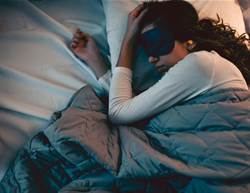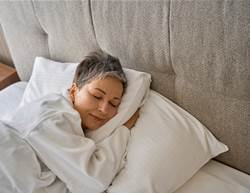There’s no disappointment quite like sleeping for eight to ten hours only to roll out of bed feeling just as tired, if not more than you were the night before.
It’s an easy pattern to brush off as part of life, but if you’re not waking up revitalised or feel like you’re always running on empty, something’s definitely up. Below, sleep experts explain reasons why you wake up tired (and feel like you’re always tired), and how to stop the vicious cycle of sleepiness.
Reasons you wake up tired
There are a slew of reasons why you might wake up on the wrong side of the bed – and stay there all day. You have more control over some than others.
1. Sleep inertia
Just in case you’ve never heard of it: sleep inertia is the technical term for typical morning grogginess. It’s why you may feel a little wobbly on your feet or disoriented after getting out of bed – your brain is essentially still waking up.
“Studies have shown that blood flow in the brain is slower for up to 30 minutes after waking compared to before going to sleep,” explains dietitian Robin M. Tucker, who studies the intersection of nutrition and sleep. She adds that the sleepy sensation lasts anywhere from 15 minutes to an hour for most people, but others can experience it for several hours.
“Sleep inertia typically lasts longer after nights of insufficient sleep, especially if those nights are consecutive,” Tucker says. “While it can be annoying not to be able to jump out of bed and be at your best, some scientists believe that sleep inertia helps you to get back to sleep quickly and prevents unwanted awakenings.” With that being said, waking up during deep stages of sleep is believed to cause more serious sleep inertia, she adds.
For obvious reasons, it can be kind of tricky to differentiate between the normal drag and general fatigue, but sleep expert Dr Peter Polos says sleep inertia usually clears as the day progresses, whereas more persistent exhaustion may linger throughout the day, often only relieved by more sleep or napping.
2. Blue light exposure
Whether you want to believe it or not, your screen time seriously impacts your sleep, especially the quality of it. Yet many of us engage in what Tucker calls “revenge bedtime procrastination,” or the decision to stay up after a busy day to partake in the leisure activities we’d otherwise miss out on (i.e. scrolling, watching TV) instead of sleep.
“Using computers, tablets, cell phones, and TVs too close to bedtime can inhibit melatonin release and delay sleep onset, so it’s best to shut them down an hour before bed to avoid extra exposure,” says Dr Polos.
He adds that we sleep best in a dark, cool room (between 16 to 20 degrees Celsius), so if you’re falling asleep with the TV on, it could be stealing your restorative ZZZs.
3. Poor sleep hygiene
Having good sleep hygiene means maintaining a bedroom environment and daily routine that promote restful sleep. Making small tweaks to bedding or bedtimes can make a world of difference. “Make sure you sleep on a comfortable bed that supports you from head to toe,” says Dr Polos.
Pillows are just as important – Dr Polos says to find one that fits your sleep style, whether you’re a side sleeper or need neck support.
4. Drinking too much caffeine or alcohol
Caffeine is a stimulant, and that afternoon pick-me-up could be affecting you more than you realise. “Some people metabolise caffeine more slowly than others,” explains Tucker.
Although alcohol is a depressant, it can disrupt the REM stages of sleep, adds Dr Polos, keeping you from entering the deep sleep needed for restoration. That’s why he recommends avoiding either substance up to four hours before bedtime.
5. Sleep disorders
Sleep disorders like insomnia and obstructive sleep apnoea commonly interfere with sleep and wakefulness. People with sleep apnoea in particular are prone to feeling tired even after a full night’s sleep.
“[It] causes the airway to close repeatedly throughout the night,” explains Tucker, which jolts you awake to breathe. “You might not remember these awakenings, but they are disruptive and can cause people to fail to feel refreshed after sleeping,” she adds.
Major signs of sleep apnoea are heavy snoring and daytime drowsiness, and a sleep test is required for diagnosis.
6. Genetics
It really is true that some people are naturally night owls and others are morning birds. “These are usually genetically predetermined,” says Dr Polos. “They can be modified to some degree but typically, one cannot be replaced by the other.”
7. Lack of exercise
You might think working out would make you more tired, but the opposite is true. In fact, exercise has been found to combat workplace fatigue, boost energy, and conversely, research shows it can help you sleep longer and more soundly at night, allowing you to wake up feeling refreshed.
8. Poor mental health
While a lack of sleep is sure to affect your headspace, mental health can wreak havoc on sleep, too. Research shows that around 40% of young depressed adults struggle with hypersomnia, or feelings of excessive tiredness. Anxiety and worry – especially PTSD – can also affect quality of sleep.
How do I stop waking up tired?
Aside from the habits already mentioned, there are a few other ways you can feel more alert, faster in the mornings.
Let the light in
“Exposure to light, especially sunlight, in the morning helps to wake us up,” says Tucker, adding that overall, more exposure to daylight also encourages earlier sleep onset.
That’s because light and circadian rhythm are intrinsically linked, and so the exposure advances the natural sleep cycle, adds Dr Polos. So, it may be time to ditch the blackout curtains or try a sunrise-mimicking alarm clock to get the light you need to stay on track.
Stop hitting snooze
Ever feel even more tired after sleeping the 10 minutes your snooze button allows? That’s because hitting snooze increases the likelihood that you’ll wake up during a deep stage of sleep, which worsens sleep inertia, explains Dr Polos. So, it’s best to set your alarm for the amount of hours you need to get a good night’s rest, or stay awake during your snooze periods, using the alarms to help sleep inertia dissipate.
Exercise
Dr Polos says doing yoga or taking a brisk walk an hour before bed are known to support sleep. “Exercise is always a great decision and can help promote quality sleep as a key component of your overall health,” he adds.
Set a bedtime (and wake time) and stick to it
Yes, even on the weekends. “In working with people who are dissatisfied with the amount or quality of sleep they get, we find that maintaining a consistent bedtime and wake time is a simple but very powerful tool to getting more and better sleep,” says Tucker.
While it may be a challenge at first, it will be worth it. “Sleep isn’t wasted time,” Tucker adds. “It’s vital to your health and should be prioritised.”
Practice self-care
Prioritise your mental health by consulting your doctor about your concerns, finding a therapist, or simply taking more time for yourself to decompress after a long day.



.jpg&h=90&w=90&c=1&s=1)






